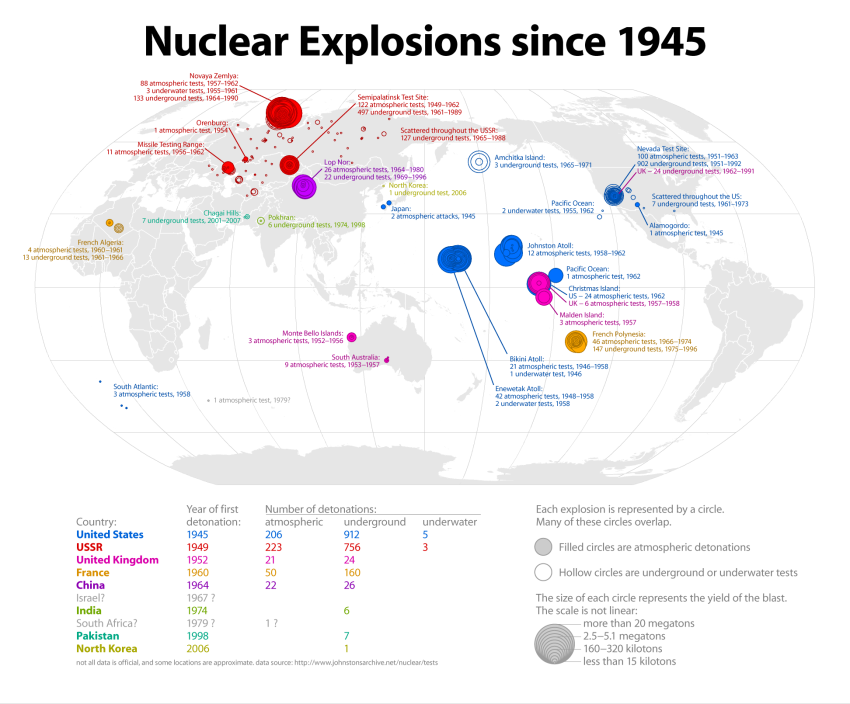
In April last year, the government of the Marshall Islands announced it would be taking nine nations — China, France, India, Israel, North Korea, Pakistan, Russia, Britain and the US — to the International Court of Justice (ICJ) in The Hague over their possession of nuclear weapons.
The Marshallese have paid a heavy price for other countries’ nuclear weapons. After World War II, they were incorporated into the United Nations Trust Territory of the Pacific Islands administered by the US.
The administering government was given a duty to prepare the territory for independence, which was not fully achieved until 1990. During the period 1946-1958, the Marshall Islands were the location for 67 US nuclear tests that exposed inhabitants to such severe levels of radiation that the effects are still being felt today.
The tests included the largest nuclear device ever detonated by the US, in a 1954 operation known as Castle Bravo. The bomb, dropped on Bikini Atoll, was three times more powerful than expected and caused huge radiation poisoning to occupants of nearby islands and a Japanese fishing vessel in the area.
The supposedly secret test quickly became an international incident that prompted calls for a ban on the atmospheric testing of nuclear weapons. Fallout reached India, Japan, Australia, the south-western US and even parts of Europe.
Its impact, in terms of aborted foetuses and birth defects, is still felt.
Case against Britain
On March 17, Marshall Islands foreign minister Tony De Brum handed the ICJ a memorandum outlining, in detail, his nation’s case against the British government.
The Marshallese initially tried to arraign all nine nuclear states at the ICJ. But the case is only progressing with India, Pakistan and Britain, the three nuclear-armed countries that accept the ICJ’s jurisdiction.
The Indian and Pakistani governments have raised objections leading to a stalling of their respective cases, but so far the British government has not. Britain is in the unique position of being the only one of the nine states that has both accepted the jurisdiction of the ICJ and signed the Non-Proliferation Treaty (NPT).
Remarkably, the Marshall Islands is not pursuing further compensation. It received about £500 million between 1956 and 1999. Rather, in the words of Tony De Brum, it is “fulfilling a moral and legal mandate as members of the [NPT] treaty and as people who have experienced the horrors of nuclear contamination”.
The Marshall Islands’ demand is that Britain’s fulfils its obligations to the NPT. Specifically, its obligations related to Article VI, which states that the nuclear states must take steps to negotiate towards disarmament “in good faith”.
Speaking in New York last year, De Brum said: “What we hope to achieve is a nuclear-free world. It is sometimes said we are too small and insignificant to make an impression on those who make those decisions.”
However, he said, it was incumbent upon the Marshallese to remind the nuclear states that it “is necessary for them to own up to their promise to reduce nuclear weapons on this earth”.
Britain has until mid-December to respond. In theory, it could be facing a trial at The Hague as early as 2016.
Trident
All this comes at a significant time for Britain. Its leaders are due to make a decision on the renewal of the Trident nuclear weapons program next year. The international community is growing tired of the nuclear states’ inaction on disarmament and there is already some agitation for a new treaty to ban nuclear weapons.
The Austrian government is leading the way with the “Austrian Pledge”, adopted at the Vienna Conference on the Humanitarian Impact of Nuclear Weapons in December 2014. This commits signatories to work to “stigmatise, prohibit and eliminate nuclear weapons in light of their unacceptable humanitarian consequences and associated risks”.
Britain will attend a conference on the NPT in May with almost nothing to say for itself. Since the conference will take place alongside the general election, the delegation will have no official position.
This is not likely to win any favours among those nations already disgruntled that the British government is, so far, not engaging on disarmament.
So could the Marshall Islands’ case provide a chance for the international community and British civil society to push for the non-renewal of Trident?
Much hinges on what government is elected in May. The Tories are unwavering in their support for a like-for-like replacement of Trident, which would cost £100 billion over the next 30 years. Labour is hesitant about saying anything different publicly.
The Liberal Democrats favour taking “a step down the nuclear ladder” and scrapping the current policy of continuous at-sea deterrence. The Greens, pro-independence Welsh party Plaid Cymru and the Scottish National Party are agreed on unconditional opposition to nuclear weapons in any form.
Anything other than a Tory government would leave open the possibility of pursuing a different policy on nuclear weapons, with Labour certainly having to negotiate Trident policy if it requires the support of the SNP to form a government.
With the international community already putting the spotlight on the nuclear states, a major international court case in which the British government stands trial in The Hague would provide a chance for campaigners to push the government towards a new position.
Public opinion will play a significant role in determining which way the cards fall. Five million have signed a petition in support of the Marshall Islands’ case. A British poll last year showed that 51% were against renewing Trident like-for-like and 26% were undecided.
Small in number though the Marshallese may be, they may prove to be not too small or insignificant to help bring about an important shift towards a nuclear-free world.
[Abridged from Red Pepper (archived by Internet Archive).]